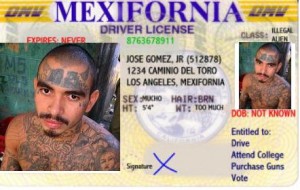

01/14/2014

In the one-party Democrat state, the implementation of drivers licenses for lawbreaking foreigners costs a lot and the taxpayers are forced to pony up. Increased fees on the beneficiaries could have been used, but no, the law-abiding public must be billed because Americans are rich and illegal aliens are poor victims of capitalist greed.
Or something like that, in the minds of SacraMexico Democrats.
And the $65 million is just the down payment to get things going. Processing the new licenses over three years will cost an estimated $141 million. But that number is presumably based on the number of two million illegal aliens in the state, and nobody believes it’s that few.
The standard fee now for a state DL is $33, which is not very much. Illegal aliens are thrilled to get driving permits to remove the fear of deportation when they get stopped for a traffic violation. They are very motivated to drive to their stolen jobs. One foreigner interviewed when Nevada recently opened the DL floodgates said he had paid $6000 in fines for driving illegally.
I’m guessing that a drivers license for illegal aliens priced at $500 would fly out the DMV door, because the ability to drive legally is a kind of min-amnesty and is therefore highly valued. But Mexifornia Democrats feel they must constantly pander to the demanding lawbreaker community, so taxpayers are financially screwed again. Not to mention the threat to public safety and national security.
Brown: $65 million for immigrants’ driver’s licenses, Orange County Register, January 10, 2014
The Department of Motor Vehicles plans to hire about 1,000 new employees and open five new temporary offices — including one in Orange County — to handle an expected onslaught of applications from undocumented immigrants who will qualify for a California driver’s license by next year.
The cost to process the expected 1.4 million new licensees over three years: $141 million.
On Thursday, Gov. Jerry Brown proposed allocating nearly $65 million from his state budget plan to pay for new hires and five facilities that will remain open for two to three years in Orange County, Los Angeles, San Diego, South Central Coast and Santa Clara/San Jose. The money would pay for 1,000 employees, among other things, DMV spokesman Armando Botello said.
Two recently added facilities in Fresno and in Lancaster-Palmdale would handle the increased workload from those areas. The plan does not include new sites for San Bernardino and Riverside, but residents there can get their new licenses from existing facilities, Botello said.
The Legislature, late into the last night of its last session, passed AB60, the undocumented immigrant’s bill sponsored by Assemblyman Luis Alejo, D-Salinas. The law takes effect by Jan. 1.
The cost of the program was initially projected to be $140 to $220 million for the first three years. The new licenses would raise about $50 million. AB60 did not allocate any additional money, but Alejo’s staff indicated at the time that the fee for undocumented immigrants could increase to make up the shortfall.
On Thursday, Alejo said in a statement that the decision to increase fees is up to the DMV. Botello said DMV officials have not yet decided whether to increase the $33 application fee for undocumented residents.
Sen. Lou Correa, D-Santa Ana, who called the new law “a good public safety measure,” said: “We’re going to come back and look at the shortage and see what measures can be taken to address the shortfall between the fees and the additional services.”
Assemblyman Allan Mansoor, R-Costa Mesa, who voted against AB60, said “the taxpayers are once again footing the bill.”
Advocates said the new law will improve safety for everyone on the road and also help the state’s estimated 2 million-plus undocumented immigrants get to their jobs, take their kids to school and move across town without fear of tickets, car impoundments and possibly arrest.
Critics counter that the law rewards lawbreakers and is in conflict with federal law. They also express concern about fraud and question how DMV officials will ensure that people are who indeed they claim to be when applying for licenses.
DMV officials have yet to iron out details, but have met with consuls, law enforcement agencies and others to discuss, among other things, what types of documentation will be required from applicants, said DMV spokeswoman Jan Mendoza.